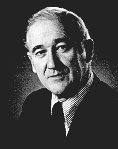William J. Driver
 |
WILLIAM J. DRIVER William J. Driver, who died June 25, 1985, served as Commissioner of Social Security in 1980-81. He previously had served as President of the Manufacturing Chemists Association in 1969-79 and as Administrator of the Veterans Administration in 1965-69.
|
And that promise was fulfilled on July 30, 1965 when President Johnson traveled to Independence, Missouri to sign the Medicare legislation at the Truman Library with President Truman present (he had made the Medicare program his goal during his years in the U.S. Senate). President Johnson said that this Act lifted the burden of crushing medical expenses from the shoulders of 18 million Americans over the age of 65--many with low incomes and threatened by unaffordable medical expenses. And so it did until high medical costs, increasing each year, passed the amount paid by Medicare. Between 1982 and 1986 Medicare expenditures will have been reduced by nearly $22 billion. This severe reduction is due to changes in the law over the past 2 years. The elderly, the disabled, the poor have had their access to health care limited. Tightened eligibility requirements for benefit programs, combined with economic barriers, has caused the average Medicare beneficiary to pay as much for a hospital episode as he or she did before there was a Medicare program. There is a need for drastic change in this Nation's health care system. Every American should be able to receive good, quality health care conveniently and effectively delivered across the land. Public and private facilities and financial support can and should make this possible. We are and have been treating non-service connected veterans this way for many years. Basic, quality medical care for all should not be treated as a privilege to be passed out by the Congress and the President. Of course, change in this direction cannot happen overnight, but we should be heading toward such a positive goal--not away from it. Today we are told over and over that we must reduce existing protection, that we must put more and more costs on beneficiaries. That cannot continue if we are to achieve an equitable medical insurance program for all Americans. It is essential for everyone--young and old, alike--to seek controlled, quality medical care for all, mandatory assignment for all physicians, and, federally financed non-profit Health Maintenance Organizations under Federal supervision. Only then will we be able to gradually move towards a national health care plan. A blue-ribbon commission--similar to one President Reagan established in 1981 to solve the Social Security financing crisis--should be established immediately to examine various options and make public its findings. We have been delaying far too long. Now is the time for action. President Truman's words nearly 20 years ago at the signing of the Medicare legislation are as valid today as they were then: "This is an important hour for the Nation, for those of our citizens who have completed their tour of duty and have moved to the sidelines. These are the days that we are trying to celebrate for them. These people are our prideful responsibility and they are entitled, among other benefits, to the best medical protection available." |
|